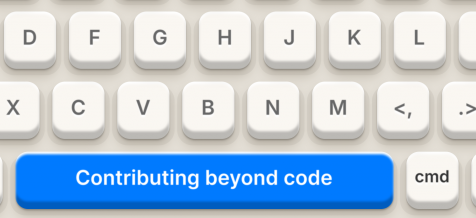- Topic 6: What other forms beyond code can complement your contribution? How can you enhance outreach and accessibility by considering non-code-related contributions?

While code is often at the centre of open-source projects, one of the most important lessons I’ve learned during this module is that non-code contributions are just as vital to the success, sustainability, and accessibility of these projects. Translation, documentation, design, community support, and outreach all play key roles in shaping how useful and inclusive a project becomes.

Type of contributions
- Translation
As part of my contribution to the Italian translation of freeCodeCamp’s curriculum, I experienced firsthand the impact of non-code work. Translating content into Italian wasn’t just about language, it was about making technical knowledge accessible to an entirely new audience. This meant adapting tone and terminology, checking whether English tech words had equivalents or were commonly used as-is in Italian, and ensuring consistency with existing translations. This work helps break language barriers that often prevent learners from non-English-speaking backgrounds from fully engaging with valuable educational material.
2. Documentation
Another powerful way to contribute is through improving documentation. Many open-source projects have great code but poor documentation, making it hard for newcomers to get started. Clear, beginner-friendly instructions can dramatically improve onboarding and encourage more diverse participation. Creating tutorials, FAQs, or walkthroughs can also complement the work of developers by guiding both users and contributors.
3. Design
Design is another non-code area that’s often overlooked. User interfaces (UI), logos, and visual consistency shape how approachable a project feels. An intuitive and welcoming design can increase adoption, especially for educational platforms like freeCodeCamp that aim to reach a broad, global audience.
4. Community support
Community engagement and moderation are also essential forms of non-code contribution. Helping to answer questions in forums or issue trackers, welcoming new contributors, or providing constructive feedback all support a healthy and sustainable project culture. These roles ensure that open-source communities remain inclusive, respectful, and learner-friendly.
5. Outreach
Finally, outreach and advocacy play a huge role in expanding the impact of open-source projects. Writing blog posts, giving talks, or sharing updates on social media can help raise awareness and attract new contributors and users. For instance, sharing my translation experience and linking to the published article helps promote the multilingual efforts of freeCodeCamp, encouraging others to get involved or benefit from the translated content.
Conclusion
In sum, contributing beyond code is about using your unique skills to support a project’s mission. Whether you’re multilingual, a strong communicator, an empathetic community builder, or someone with an eye for design, there’s a place for you in open source. My work on translations has shown me how powerful these roles can be, not just in improving accessibility, but also in strengthening the global, collaborative spirit that defines open source.
References
Open Source Guides (2025) How to Contribute to Open Source | Open Source Guides. Available at: https://opensource.guide/how-to-contribute/ (Accessed: May 23, 2025).
OpenSauced (no date) Types of Open Source Contributions | Open Source Education with OpenSauced. Available at: https://opensauced.pizza/learn/intro-to-oss/types-of-contributions (Accessed: May 23, 2025).
